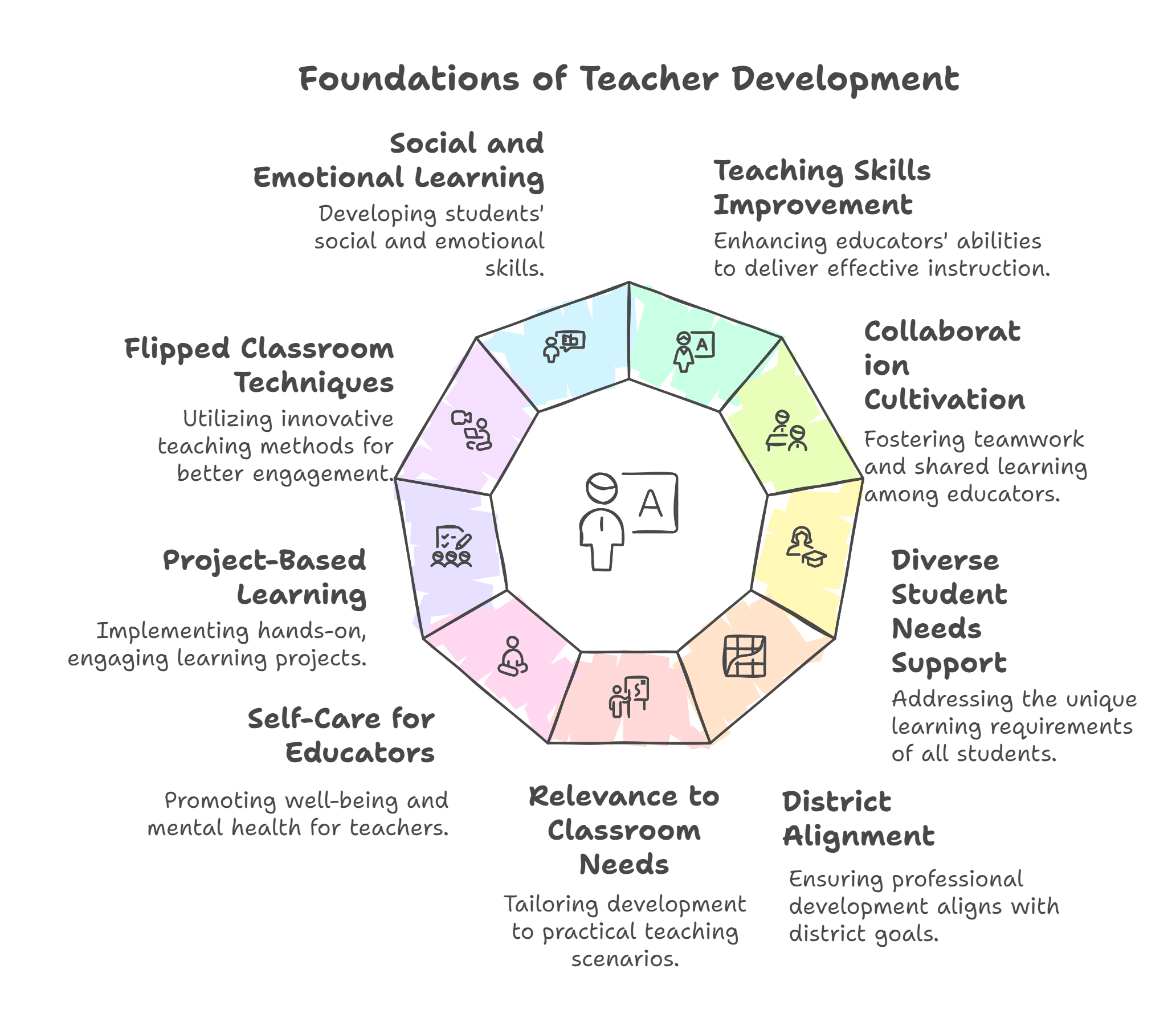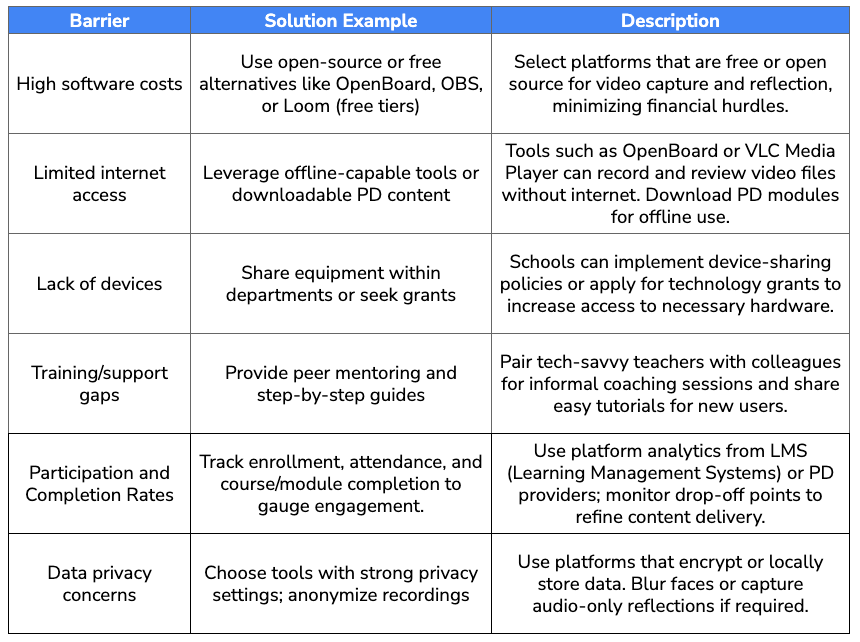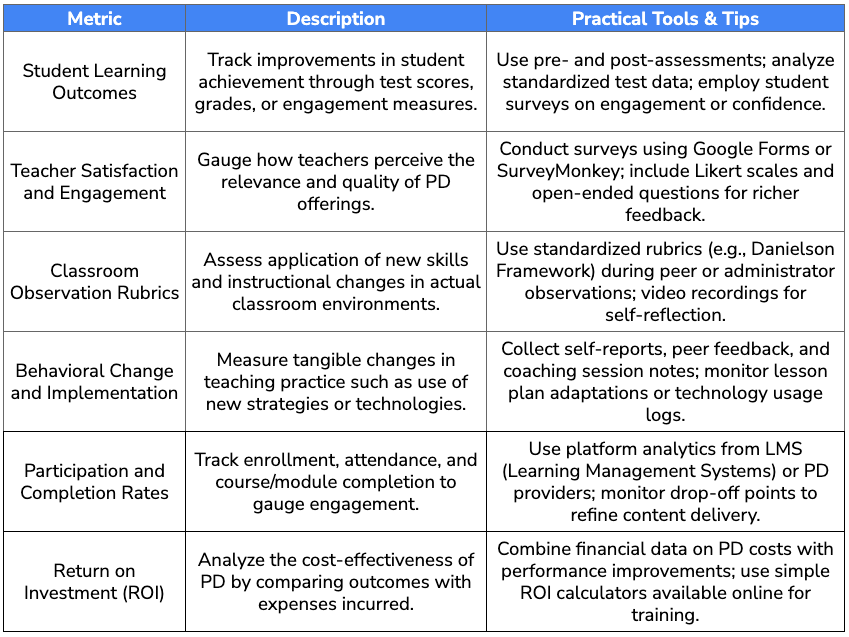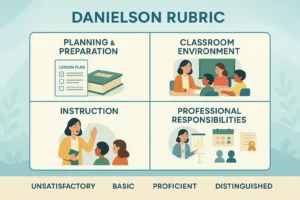Looking to improve your teaching skills and support your students better? This article on professional development for teachers offers actionable tips, strategies, and resources to help you grow and succeed in the classroom.
Key Takeaways
Professional development is essential for teachers, helping them address classroom needs and improve student outcomes.
Self-care, innovative teaching methods like Project-Based Learning, and flipped classroom techniques can improve teacher effectiveness and student engagement.
Online courses and resources, along with personalized strategies, provide flexible and impactful professional development opportunities for educators.
The Importance of Professional Development for Teachers

Professional development is important for modern educators, as it improves teaching skills, cultivates collaboration, and supports diverse student needs. By equipping teachers with effective strategies, professional development helps address achievement gaps and improves classroom practices.
Consequently, engaging in high-quality professional development prepares teachers to meet their students’ immediate needs, leading to better student engagement and outcomes.
Moreover, district-level initiatives and standards often shape the professional development opportunities available to teachers. District approval or support can impact access to specific learning activities and ensure alignment with district-specific goals, which further strengthens the relevance and effectiveness of these opportunities.
In fact, high-quality professional development must be relevant to classroom needs. When teachers see the content as applicable to their teaching contexts, they are more motivated to engage and apply what they learn.
Research indicates that relevant development significantly increase as student attainment, helping close achievement gaps. This evidence underscores the key role of professional development in education.
To maintain this motivation and improve effectiveness, professional development must closely correlate with teachers’ immediate classroom needs. This alignment keeps educators engaged, as focusing on practical, real-world applications can transform teaching practices and improve student outcomes.
Furthermore, professional development encompasses various important topics, including self-care for educators, Project-Based Learning (PBL), and flipped classroom techniques. These areas are pivotal in cultivating a holistic approach to teacher growth and classroom effectiveness. Technology integration also plays a crucial role, helping teachers prepare students for future challenges in a digital world.
In addition, social and emotional learning (SEL) is a key focus in many professional development programs, helping teachers address social issues and improve social skills in the classroom.
Together, these interconnected elements highlight how thoughtfully designed professional development initiatives can empower teachers, ultimately leading to more effective education and improved student success.
Self-Care for Educators
In the demanding world of education, self-care is essential for sustaining teacher well-being and productivity. Programs like SMART (Stress Management and Relaxation Techniques) help educators improve their mental and emotional well-being.
Prioritizing self-care helps teachers maintain their energy and enthusiasm, benefiting their students. Including self-care in professional development equips educators to handle the rigors of teaching while maintaining their health and well-being.
Project-Based Learning (PBL)
Project-Based Learning (PBL) redefines traditional education by promoting hands-on, practical learning experiences. This approach engages students in real-world problems and projects, encouraging communication and critical thinking.
Sample Implementation
Objective: Engage students in applying environmental science concepts by designing a community garden that supports local ecosystems.
Materials Needed:
- Site map or local garden space.
- Research materials on native plants and pollinators.
- Garden planning templates or digital design tools.
- Supplies for creating signage (poster boards, markers, etc).
- Access to local experts or community organizations (optional).
Steps:
- Research: Students investigate native plants, soil conditions, and pollinator species common to their community.
- Design: Groups draft garden layouts that consider plant compatibility, seasonal changes, and ecological benefits.
- Plan Action: Students identify resources needed, possible locations, and any community partners to engage.
- Presentation: Groups present their garden proposal, explaining how it teaches environmental science principles and benefits local biodiversity.
- Implementation (optional): Depending on resources, students may plant and maintain the garden or create a virtual portfolio to share with community organizations or schools.
This project deepens understanding of ecosystems while stimulating skills like teamwork, research, and design thinking.
For teachers, PBL encourages innovation and creativity, making the teaching process more dynamic and fulfilling.
Flipped Classroom Techniques
Flipped classroom techniques revolutionize traditional teaching by delivering content online, dedicating in-class time to interactive learning activities and providing clear instruction to teach this method.
This method restructures classroom dynamics, enabling teachers to focus on hands-on activities that reinforce learning.
Sample Implementation
Objective: Strengthen students’ grasp of fractions through video lessons and interactive class problem-solving.
Materials Needed:
- 5-minute instructional video on basic fractions (either created by the teacher or from an educational platform).
- Worksheets or digital quizzes for in-class practice.
- Manipulatives like fraction tiles or digital fraction tools.
- Whiteboard or collaborative platforms for group work.
Steps:
- Pre-Class Assignment: Assign the fraction video as homework where students watch and take notes or answer quick questions embedded in the video.
- Class Activity: Begin with a brief Q&A to clarify doubts from the video.
- Group Problem Solving: Students work in small groups on fraction problems, using manipulatives to visualize concepts.
- Teacher Facilitation: Circulate to guide groups, offer hints, and encourage discussion to deepen understanding.
- Reflection: End with a class discussion or exit ticket to assess comprehension and gather feedback.
Implementing this approach not only improves student engagement but also allows teachers to address individual student needs more effectively.
Online Professional Development Courses
The digital age has brought a myriad of online professional development courses tailored for teachers. Platforms offering flexible and accessible learning opportunities include:
- Annenberg, which offers a huge selection of professional development for K-12 teachers free of charge, though colleges must purchase a license.
- PBS TeacherLine,
- Teaching Channel,
- The Library of Congress, which offers free professional development modules for educators.
These courses are often free or low-cost, cover various educational topics, and can be accessed at the educator’s convenience.
PBS TeacherLine provides self-paced courses with credit options through university partnerships, while the Teaching Channel offers graduate-level courses to improve teaching skills.
Additionally, platforms like Alison and Waterford offer free webinars and resources, making professional development more accessible to teachers everywhere. edWeb, for instance, provides free webinars with CE certificates, supporting teachers in meeting their professional development requirements.
Coursera
Coursera is a valuable platform for teacher professional development, offering a wide range of courses in collaboration with various universities. These courses cover different aspects of teaching and education, allowing teachers to become part of a community that improves their skills without geographic barriers. Most courses can be taken for free, though there is a fee for certificates. PBS TeacherLine also allows teachers to choose from various online courses, which can earn them continuing education credits.
This accessibility ensures that educators can continually improve their public practice, ultimately benefiting their students and allowing them to connect.
edWeb
edWeb is renowned for delivering high-quality professional development through live and on-demand webinars on various educational topics. Teachers can access free webinars and printable certificates, making it an invaluable resource for continuous learning.
National Geographic’s Online Courses for Educators
National Geographic offers online courses focusing on motivating students, designing lesson plans, and solving global challenges in science. These free courses come with lesson materials and offer the opportunity to earn graduate credits, making them an excellent resource for teachers seeking to expand their educational state impact.
Similarly, Annenberg Learner provides a large selection of free professional development resources for K-12 teachers.
Webinars and Workshops for Teacher Development
Webinars and workshops provide flexible opportunities for teachers to improve their skills and learn new strategies. These sessions cover a wide range of topics, from special education to health education, and even the neuroscience of learning. Teachers can earn certificates verifying their completion of these webinars, which may count toward continuing education or license renewal. Waterford.org, for example, offers free professional development webinars focusing on reading instruction strategies.
Costs for professional development workshops vary but often start as low as $45, making them accessible for many educators. This affordability, combined with the convenience of online access, makes webinars and workshops a popular choice for professional learning.
SimpleK12
SimpleK12 offers a plethora of educational webinars that teachers can watch from home, many of which are free. Covering various teaching topics, these webinars cater to diverse professional development needs. For full access to their content, a subscription fee is required.
A monthly subscription costs $29.99, while a yearly subscription is $199.
Learning for Justice
Learning for Justice focuses on:
- Webinars about equity, access in schools, allyship, and responding to hate and bias.
- On-demand webinars that help teachers fulfill their professional development requirements.
- Virtual and hands-on workshops available for a minimal fee.
TeachersFirst Workshops
TeachersFirst workshops are designed to take place after school hours, lasting approximately 90 minutes. These early interactive sessions encourage collaboration among educators, making them an engaging and practical component of professional development.
Tips for Selecting Relevant PD Content
- Align With Your Goals: Clearly identify what skills or topics you want to learn (e.g., classroom management, assessment, technology integration) and filter your course search accordingly.
- Check Accreditation and Certification: Favor platforms and courses that issue recognized certificates or PD credits if your district/school requires them.
- Start With Introductory Content: Look for courses labeled as “beginner,” “foundation,” or “essentials” if you’re new to a subject.
- Read Course Reviews: Check for ratings and testimonials to gauge course quality and relevance to your needs.
- Leverage Search Functions: Use platforms’ search bars with specific terms (e.g., “SEL,” “English language learners,” or “differentiation”) to quickly access targeted content.
- Join Communities: Engage in forums or Q&A sections, especially on platforms like edWeb or Teaching Channel, to ask questions and share ideas with peers.
Beginner-Friendly Recommendations
- For Classroom Management: “Classroom Management Basics”.
- For Social-Emotional Learning: Search “SEL” on edWeb and Learning for Justice for targeted webinars and mini-courses.
- For Technology in the Classroom: Search for “Professional Development Courses for Digital Age Classroom”.
- For Differentiated Instruction: Use Coursera and FutureLearn’s “Teaching Every Student” and “Inclusive Teaching” offerings.
With these resources and strategies, teachers at any experience level can chart their own personalized professional growth path, choosing courses that are not only free but also high-impact and immediately applicable in the classroom.
Innovative Professional Development Strategies
Teachers’ growth requires ongoing and collaborative professional development. Traditional approaches often fail to align with classroom needs and lack collaboration. Innovative strategies to address these gaps include:
- Action research toolkits.
- AI-driven personalized professional development (PD).
- Video reflection tools.
- Teacher-led sprints.
Action research toolkits empower teachers to investigate their teaching practices, collect data, and check their effectiveness. These toolkits support mentorship roles and provide key frameworks for continuous improvement.
AI-Driven Personalized PD
AI technology can revolutionize professional development by assessing individual teacher performance and preferences to create customized learning pathways. This ensures that professional development is relevant and tailored to each teacher’s specific needs, enhancing their professional growth.
Video Reflection Tools
Video reflection tools enable educators to capture and critically evaluate their classroom practices. Reviewing recorded observations allows teachers to identify areas for improvement and implement changes, leading to meaningful self-improvement.
Teacher-Led Sprints
Teacher-led sprints empower educators to design their own professional development experiences based on relevant classroom challenges. That way, teachers can emphasize autonomy and relevance, reducing dissatisfaction with mandated programs.
Overcoming Technology Barriers
While AI-driven professional development (PD) and video reflection tools offer innovative opportunities for teacher growth, several practical barriers can limit access and adoption.
Common Challenges Include:
- Software Costs: Many AI-powered PD platforms or video analysis tools require subscriptions or hefty licensing fees, posing budget challenges for individual teachers and under-resourced schools.
- Limited Internet Access: Reliable connectivity is not universal. Educators in rural or underserved areas may struggle to access cloud-based PD tools or submit video reflections online.
- Device Availability: Not all teachers have access to current laptops, tablets, or smartphones capable of running advanced PD applications.
- Training and Support Needs: Adopting new technology requires time and technical know-how. Lack of guidance can discourage teachers from incorporating these tools into their PD routines.
- Data Privacy Concerns: Using video or AI-driven platforms may raise worries about student confidentiality and compliance with privacy laws.
Solutions and Workarounds
Additional Recommendations
- Open-Source Video Reflection: Tools like OpenBoard (for digital whiteboarding and video recording) and OBS Studio (for screen and video capture) are free and work offline, making them accessible for most educators.
- Offline PD Modules: Many districts and PD providers now offer downloadable workshops, podcasts, and resource packets for self-paced, offline learning.
- Community Resource Hubs: Collaborate with local education centers or teacher networks to pool resources and share technology.
Anticipating technology barriers and applying practical, low-cost solutions, schools and teachers can ensure that the benefits of AI-driven PD and video reflection are broadly accessible and sustainable.
Peer Learning and Collaboration
Collaborative professional development, through professional learning communities (PLCs) or peer mentoring, offers teachers accessible, high-impact ways to grow their practice. Peer learning harnesses the collective expertise within a school or district, encourages lasting teacher engagement, and provides cost-effective PD that adapts to the needs of real classrooms.
The Value of Peer Learning
- Built-in Expertise: Teachers share tried-and-true strategies directly relevant to their unique student populations.
- Ongoing Support: Regular collaborative sessions build trust, facilitate honest problem-solving, and promote mutual accountability.
- Cost-Effective: Internal PD maximizes available resources and reduces reliance on external trainers or expensive programs.
- Engagement & Motivation: Working with peers enhances motivation and reduces isolation, supporting professional satisfaction and retention.
Forming an effective PLC requires intentional structure and buy-in. Here’s a step-by-step guide:
- Define the Focus: Choose a shared theme, such as improving project-based learning (PBL), implementing new technology, or deepening cultural responsiveness.
- Form the Group: Gather 4–8 teachers with diverse experience and roles who are interested in the chosen focus area.
- Schedule Regular Meetings: Consistency is key. Schedule meetings biweekly or monthly (e.g., “Meet monthly to discuss PBL strategies”).
- Establish Clear Norms: Agree on confidentiality, constructive collaboration, and self-accountability.
- Collect and Share Resources: Rotate sharing lesson plans, student work samples, or research articles relevant to your focus.
- Action and Reflection Cycle: Set small, actionable goals after each meeting (e.g., each member tries a new strategy), then reflect and refine together in the next session.
- Document Progress: Keep notes, action items, and highlights using shared digital folders or meeting logs to track impact and growth.
Peer Mentoring Approaches
- One-on-One Mentoring: Pair newer teachers with experienced colleagues for lesson planning, classroom observations, and feedback.
- Peer Coaching: Teachers observe each other’s lessons and provide supportive, targeted feedback without administrative evaluation.
- Collaborative Lesson Study: Small teams design, teach, observe, and revise lessons together, focusing on student learning outcomes.
Resources and Tools for Effective Professional Development
Effective professional development resources are essential for teachers seeking to cultivate their skills and practices. These resources should be efficient, cover a wide range of topics, and be available both in-person and online.
Teachers also benefit from resources that support the implementation of learning from professional development sessions. One-click resource libraries, grant-ready PD proposals, and action research toolkits are invaluable tools that streamline the professional learning process.
One-Click Resource Libraries
One-click resource libraries simplify the process for teachers by providing easily accessible materials that support the implementation of learning from professional development sessions. These libraries address the lack-of-materials barrier in PD implementation, making it easier for educators to apply their new skills.
Grant-Ready PD Proposals
Templates for grant proposals can help educators secure funding for their professional development initiatives. These templates streamline the application process, providing pre-prepared ideas to common questions posed by funders.
Action Research Toolkits
Action research toolkits promote teachers’ professional growth by providing structured guidance and resources for implementing research effectively in the classroom. They empower educators to investigate their teaching practices and transition from teacher to mentor roles.
Addressing Common Challenges in Professional Development
Modern professional development emphasizes personalized and engaging learning experiences. However, teachers often face challenges like time constraints, cost barriers, and irrelevant content.
Let’s look at these challenges in more detail as well as strategies to overcome them.
Time Constraints
Many teachers report not having enough time for professional development, with 51% indicating a lack of time to engage in courses. Integrating professional development into regular school hours can help mitigate time constraints, while micro-learning sessions provide brief and focused learning opportunities.
Cost Barriers
Cost is a major barrier to professional development, with 70% of teachers citing it as a significant obstacle. Strategies like automating lesson preparation and offering cost-efficient PD solutions can help alleviate these barriers and make professional learning more accessible.
Irrelevant Content
Irrelevant content can drain teacher energy and lower morale. Tailoring professional development to the specific needs and interests of teachers can enhance engagement and effectiveness.
PD for Rural and Under-Resourced Schools
Educators in rural and under-resourced areas often face unique challenges in accessing high-quality professional development (PD) opportunities. These challenges include geographical isolation, limited availability of resources, and a lack of substitute teachers for release time.
However, several strategies can help overcome these barriers, ensuring all teachers have access to meaningful and ongoing professional growth.
These include:
- Leveraging free online resources.
- Strategic partnerships.
- Building capacity through professional learning networks and effective teaching models.
- Addressing infrastructure and funding.
These strategies can create equitable access to high-quality professional development for rural and under-resourced schools, leading to continuous growth and improving educational outcomes for all students.
Measuring the Impact of Professional Development
Evaluating the impact of professional development is essential for understanding how it contributes to teaching practices and influences student learning outcomes.
Evaluation Tools
Effectively measuring the impact of professional development (PD) involves using a combination of quantitative and qualitative metrics alongside accessible tools that capture meaningful data. Here are key metrics and tools to consider for assessing PD outcomes:
Tips for Using These Tools
- Leverage Digital Surveys: Google Forms and platforms like SurveyMonkey are user-friendly for creating custom teacher and student surveys with automated data collection and basic analytics.
- Combine Multiple Data Sources: A holistic evaluation taps into test data, surveys, and observation notes to triangulate PD impact beyond satisfaction alone.
- Use Rubrics Consistently: Implement a clear observation rubric aligned with PD goals to ensure consistent, actionable feedback across teachers and observers.
- Track Over Time: Monitor metrics longitudinally to understand the sustainability of PD effects on teaching practice and student learning.
- Align Metrics to Goals: Select evaluation metrics that directly reflect the objectives of each PD initiative for targeted and meaningful assessment.
A thoughtful selection and application of these evaluation tools and metrics, can help schools confidently assess professional development’s effectiveness, continuously improve offerings, and ultimately improve student outcomes through empowered teaching.
Data-Driven Reflection
Data collection tools enable educators to make informed adjustments by identifying strengths and weaknesses in their professional development initiatives. Real-time feedback mechanisms allow teachers to adjust their approaches based on immediate student responses, ensuring that PD remains effective and impactful.
Linking PD to Student Outcomes
There is a significant connection between prolonged professional development for teachers and notable improvements in student performance metrics. Research consistently highlights the positive impact of extended professional development on student achievement, emphasizing the critical role that teacher growth plays in enhancing student outcomes.
Continuous Improvement
Ongoing evaluation and assessment of professional development initiatives is crucial for adapting to the evolving needs of educators and students. A systematic evaluation process allows for iterative enhancements, ensuring that PD programs remain effective and relevant.
This continuous improvement approach helps maintain high-quality professional development that supports teacher growth and student success.
Summary
Professional development is a vital component of effective teaching, offering numerous benefits for educators and students alike. By leveraging various resources and strategies, teachers can add to their skills, improve classroom practices, and ultimately increase student outcomes. Embracing innovative approaches, addressing common challenges, and continuously measuring the impact of PD ensures that professional learning remains relevant and effective.
Frequently Asked Questions
Why is professional development important for teachers?
Professional development is important for teachers because it improves their skills and increases collaboration, leading to better classroom practices and improved student outcomes.
What are some free online resources for teacher professional development?
You can explore free online resources like Coursera, edWeb, and National Geographic’s courses specifically designed for educators. These platforms offer valuable opportunities to enhance your teaching skills without any cost. Additionally, the National Education Association provides a variety of free professional development programs for its members.
How can teachers overcome time constraints for professional development?
To tackle time constraints for professional development, teachers can incorporate PD into regular school hours and utilize micro-learning sessions. Prioritizing specific time for PD in the school calendar also makes a big difference.
What innovative strategies can enhance professional development?
Implementing AI-driven personalized professional development, utilizing video reflection tools, and engaging in teacher-led sprints can significantly improve the effectiveness and relevance of your learning.
How can the impact of professional development be measured?
You can measure the impact of professional development by linking it to student outcomes and using data-driven reflection to assess its effectiveness.





